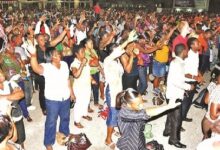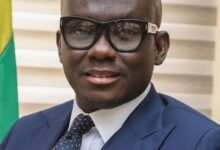After the creation of the Oti Region in 2019 the leftover or remnant Volta Region has become, more or less, synonymous with the Ewe Nation or Ewedukor. By the way, to the best of my knowledge, the Volta Region Act of 1959 has not been repealed or reviewed. The other ethnic groups in the leftover Volta Region use the Ewe language as their lingua franca. They also have strong cultural and historical affinity with the Ewes. In fact, they have lived together harmoniously as brothers and sisters for all these years. The Ewes are considered by some as enlightened, resilient and know how to fight for their rights and survival. Because of these attributes, since colonial days, Ewedukor has been a controversial area, indeed, a dilemma for successive governments. The problem has always been whether to accept or not to accept them; to accommodate or not to accommodate them; to live or not to live with them and to subdue or not to subdue them. The crux of the matter is what do you do with them and how; a typical porcupine bag whether your wear it or not, it gives you equal discomfort!
THE BRITISH COLONIAL GOVERNMENT’S SOLUTION
The British colonial government devised a divide and rule policy to contain, control and subdue them. This did not work out too well. So they tried the policy of amalgamation. By 1939 all but 15 of the 68 divisions had amalgamated into four large states. Each state had a President who was not an overlord but the first among equals. The amalgamation was quite successful in instilling some order and control in Eweland and it outlived the colonial government. The colonial system produced remarkable administrators like the unforgettable Captain Lilly. Successive governments since 1957 inherited the amalgamation. It was only in 2008 that the Chieftaincy Act, Act 759 reformed the amalgamation and the various traditional areas regained their “independence.”
The British colonialists also deployed another weapon of control that was economic neglect and underdevelopment of Eweland. This turned out to be the most effective weapon of all. The British refused to develop or create jobs and businesses in Eweland. They made the Ewes economically dependent on the Gold Coast. The idea was to depress the area economically and force the people to migrate to the Gold Coast to search for employment and sustenance. The policy worked. Both literates and non-literates headed for the Gold Coast in droves. This partly explains why there were many Ewes in the Gold Coast. It is estimated that more than 90% of educated Ewes resided in the Gold Coast (Ghana). In fact, the public/civil service, schools, mines, construction sites, cocoa farms, army and the police in the Gold Coast were inundated with Ewes. The British correctly calculated that the loss of economic power by the Ewes would translate into the loss of cultural and political power. Indeed, some even lost their Ewe identity and could hardly speak the Ewe language. Some Ewe workers went back home when they had retired and were too old to be of any economic value to Eweland. This practice still persists
THE EWE UNIFICATION MOVEMENT
In the late 1940s and early 1950s the Ewes, mostly the educated elite, intensified their agitation for a Pan-Ewe state. This led to the rise of the Ewe Unification Movement (Amenumey, 1989). Ewes were found in the Gold Coast, British and French Togolands and even in Benin (Dahomey) and this Movement wanted to bring them together to form their own state. The French colonial governments in Togo and Dahomey were very hostile to this Movement but the British approached the issue differently. In order to somehow appease them the British colonial and the CPP governments created in 1952 the Trans-Volta/Togoland which brought together the Ewes of the Gold Coast and British Togoland but left out the Ewes of French Togoland and Dahomey (Benin). The bringing together of Ewes was a secondary objective. In 1960 Trans-Volta/Togoland was changed to the Volta Region. The main objective of creating the Trans-Volta/Togoland was to subvert and destabilize the struggle for independence in British Togoland with a view to eventually integrating it with the British colony of the Gold Coast. This was successfully achieved in 1957 but it left in its wake an intractable problem of Togoland nationalism and dissent which some people have described as Ghana’s seed of self destruction or Ghana’s poisoned chalice.
MISTRUST OF EWES
Despite the creation of the Trans-Volta/Togoland which united the Ewes of British Togoland and the Gold Coast the aspirations and restlessness of the Ewes did not stop. The mistrust of Ewes by the Gold Coast people, especially the Akan, did not abate. In fact, it intensified after the 1966 coup in which Ewe elements played a major critical role. The Akan mistrust of Ewes grew under Chairman/President Rawlings. Many Akans regarded Rawlings’ governments as “Dzelukofe Mafia.” The mistrust boiled over when it became clear that the Volta Region was the strong hold of Rawlings’ party, the National Democratic Congress (NDC). A major campaign slogan of the NPP was “we want our country back.” In order to destroy the Volta Region’s grip on the NDC and for the NPP to gain strategic foothold and strength in the area President Akufo Addo’s government moved quickly to create Oti Region out of the Volta Region without repealing the Volta Region Act of 1959. Oti Region is a multi-tribal area but the Akan language has become, more or less, its lingua franca. The new Oti Region identifies itself with the Akan culture. Some tribes even claim that they are Ashanti. The NPP’s main objective was to “liberate” Oti from Ewe domination! Their thinking was that the creation of an Akan sphere of influence in Oti will automatically break NDC’s grip over the Volta Region. Let us wait and see what will happen.
Another reason for the mistrust of Ewes is their “never say die…” resilient and ubiquitous nature. They are found everywhere in Ghana, in the public/civil service; in the army; the police; the mines and cocoa farms in the Gold Coast; construction sites, name it. They whole heartedly embraced western education and Christianity and are said to be very skillful, enterprising and hardworking. They are also polyglots and adapt easily to other cultures. They can speak the other Ghanaian languages like parrots. The Akans, on the other hand, find it difficult to learn other Ghanaian languages. So they can hardly speak or understand those languages. This makes them feel extremely inadequate and defensive in the company of other tribes. This breeds mistrust and suspicion of other people, especially the Ewes. Victor Owusu’s description of Ewes as “inward looking” generally represents the Akan view of Ewes. Osafo Marfo spoke the mind of most Akans when he categorically stated that only Akans should wield or exercise political power in Ghana because they produce the economic resources of Ghana. His statement was interpreted to be an indirect jab at the Volta Region and for that matter the Ewes. His reasoning was, of course, faulty and murky. He forgot that the growth and development of a nation does not depend only on natural resources. Human resource is key, in fact, it is the most critical element in national development. And the Ewes have this in abundance. Look at the sorry state of Ghana’s economy and her underdevelopment in the midst of Gold, diamond, iron ore, cocoa, timber, bauxite, manganese and oil. Compare Ghana’s economy to that of Singapore, Malaysia, Japan, Hong Kong and South Korea which have no appreciable mineral resources but depend mainly on their human resources.
To some extent, mistrust and suspicion are also created by the cultural differences between Ewes and the Akans. Apart from speaking different languages, Ewes are ‘patrilineal’ whereas Akans are ‘matrilineal’. These cultural differences influence inheritance, family life and chieftaincy or systems of government. These differences are likely to cause Ewes and Akans to behave, view and understand things differently.
CONFRONTING THE EWE DILEMMA
Successive governments in Ghana since 1957 have tried to confront this Ewe dilemma. President Nkrumah displayed a proactive, pragmatic and accommodating attitude towards it. He tried to build a united Ghana by creating equal opportunities for all irrespective of tribe and religious affiliation. But Ewes just irritated Dr. Busia and his regime who sacked many of them from the public/civil service and state enterprises. You remember the “Apollo 568” and Busia’s “no court” episode in 1970? He went a step further to declare some Ewes aliens whom he deported under his Aliens Compliance Order. Not too long ago an Hon. NPP MP from the Central Region came out with a satanic solution to the Ewe problem “kill them”, especially those in the Ashanti Region. Under the present NPP government an unannounced Apollo 568 is being implemented. Ewe Professors, VCs and civil/public servants are being fired, sent on leave or redeployed to non-sensitive political and economic sectors. Yet another way to subdue Ewes is to deprive them of their political power or their right to vote. Ghanaians have come to accept that “your vote is your power” In 2015 a scheme to deprive Ewes of their political power was hatched at the highest level of the NPP and was openly propagated by one of its prominent leaders (name withheld for now). The Volta Region voters register, they falsely claimed, was bloated with aliens and Togolese. In fact, this NPP hatchet man and propagandist declared that there were 76,000 Togolese voters on the Volta Region register and so a new register should be compiled. Interestingly, the man in question is said to be married to a trans-humanist! They did not have their way then but in 2020 they finally did. How did they plan to prevent Ewes from registering? They deployed an occupation army to the Volta Region to intimidate, harass, brutalize and put the fear of God in the people. The occupation force, assisted by Ewe quislings and traitors, is there doing exactly what it has been instructed to do. One of the NPP MPs, Hon. K.T Hammond, was alleged to have called this occupation force “a peace keeping force”! Certainly, the Ewe tribe is not about to become an endangered species but the question is for how long will they continue to endure these flagrant provocations, discriminations and intimidations? Today it is the Ewes but whose turn will it be tomorrow? Your guess is as good as mine!
(Kosi Kedem, Former MP for Hohoe South)





